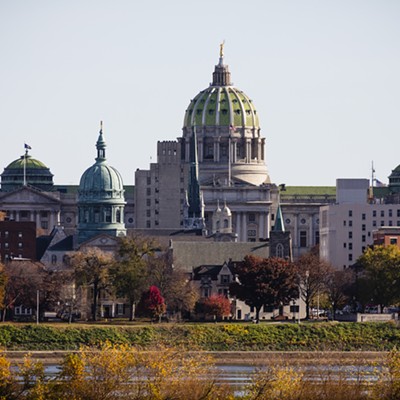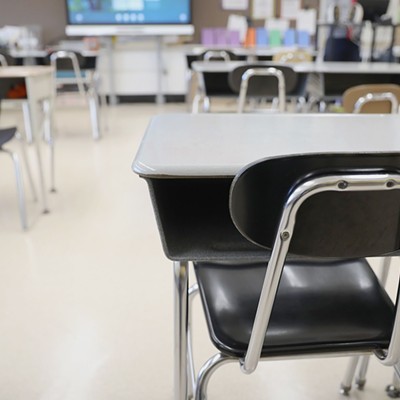Wolf’s newest proposed budget, which he revealed on Feb. 8, features what he calls a “generational investment” of almost $2 billion in K-12 education, which he and other education advocates say is badly needed.
Wolf has been outspoken in his advocacy for increased investment in public schools, and his view that Pennsylvania funds its schools inequitably. He is also one in a group of state leaders currently being sued in a trial that could have a major impact on how the state funds public education. Petitioning school districts, parents, and advocates argue that the state has failed to maintain a constitutionally required system of public education because of huge gaps in spending between rich and poor districts.
The school funding trial, which began in Harrisburg on Nov. 12, 2021 and is still in progress, considers whether Pennsylvania’s current method of allocating funds to public school districts violates the state constitution, which mandates a “thorough and efficient” system of public education. Inside of that deceptively simple question lurk many others about whose experts you believe, whether and to what extent school funding determines student success, and what the state of Pennsylvania owes its residents.
And while Pittsburgh Public Schools isn’t one of the petitioners in this trial, many argue that the outcome of this case will affect the future of public school education throughout Pennsylvania.
The case
The petitioners — six Pennsylvania school districts, the Pennsylvania Association of Rural and Small Schools, the NAACP-PA State Conference, and a group of public school parents — first filed suit in Pennsylvania Commonwealth Court in 2014 against state legislative leaders, state education officials, and the governor arguing that Pennsylvania inequitably allocates state funding among its school districts. The suit does not ask for a specific amount of money to be allocated towards education, but asks the court to rule Pa.’s current school funding system unconstitutional and appoint the General Assembly to create a more equitable funding scheme. The districts — William Penn, Greater Johnstown, Lancaster, Panther Valley, Shenandoah Valley, and Wilkes-Barre Area — and other petitioners are represented by the Education Law Center of Pennsylvania, the Public Interest Law Center — both nonprofit education advocacy groups — and O’Melveny & Myers, a national litigation firm.
The case was initially dismissed in 2015 by a Commonwealth Court judge’s determination that the courts should not be involved in school funding issues. The petitioners appealed this decision, and, in 2017, the state Supreme Court sent the case back to the Commonwealth Court, deciding that the petitioners’ claims about school funding are subject to consideration by the courts.
Pennsylvania is not the first or only state to have its education advocates sue the state for more funding. According to a 1999 scholarly anthology on school finance, “school finance litigation has flourished in state courts” since education advocates began filing suits in the 1960s. Similar lawsuits have been filed in 48 states over the last 50 years. In 2018, the New Jersey-based Education Law Center (not the same organization as the Pennsylvania-based group representing petitioners), which calls itself “the nation’s legal defense fund for public education rights,” cited a dozen states with active school funding lawsuits or outstanding court orders.
The arguments
Pennsylvania’s constitution states that the General Assembly must “provide a thorough and efficient system of public education to serve the needs of the Commonwealth.” Petitioners say that duty, paired with the Equal Protection Clause of the state constitution, means the state legislature has an obligation to ensure that all students across the state have the basic resources they need to meet the state’s academic standards, an obligation petitioners say the state has failed to meet. Specifically, they argue that the method the state uses to allocate funding to public schools is inadequate and inequitable, creating a system of “haves and have nots.”The people being sued, or the respondents, are the leaders of the state House and Senate, the state Secretary of Education and Department of Education, the State Board of Education, and the Governor. Respondents contend that that state does, indeed, meet the requirements of the constitution’s education clause.
“The question in this case is not whether Pennsylvania’s system of public education could be better,” argued Senate President Pro Tempore Jake Corman (R-Centre) in a pre-trial statement. “Any system can be improved. Every year, in fact, the General Assembly passes bills that are aimed at improving the system of public education. But imperfect is not unconstitutional.”
“It’s a very slippery slope the petitioners want to take you down,” said Patrick Northen, an attorney for House Speaker Bryan Cutler (R-Lancaster). “Smaller class sizes, expanded preschool programs, more school counselors, reading specialists, ESL support, school psychologists, etc. There’s a lot of things schools would like to have, but they aren’t mentioned anywhere in the constitution.”
Only the legislative respondents, Cutler and Corman, have chosen to argue against increased funding for public education, contending that the state’s schools are adequately funded, that more money does not necessarily mean better student outcomes, and that the state cannot be held responsible for mitigating outside factors that make it difficult for some children to succeed in school.
The strategies
Over nine weeks, the petitioners called a variety of witnesses, including teachers and administrators in the petitioning districts, experts on education economics and policy, and former state education officials. Petitioners’ counsel’s main strategies have been establishing how cash-strapped the petitioning districts are, highlighting the difference in funding in low-wealth and high-wealth districts, and arguing that more money will provide better outcomes. Panther Valley fifth grade teacher Tara Yuricheck testified that she teaches history out of a textbook so old it lists Bill Clinton as the current president. William Penn kindergarten teacher Nicole Miller lamented that her district can only afford to give her class of 25 kindergarteners 15 minutes of recess a day.
Penn State University professor Matthew Kelly shared his financial analysis, which shows, he argued, that on average, the poorest 20% of school districts in the state have $7,866 less per student than the wealthiest 20%. This is based on a calculation adjusted to reflect extra costs needed to educate a larger percentage of low-income students and to account for the districts’ taxing ability. (Without adjustment, the gap was $4,847, according to Kelly’s report.)
Economists from the University of California at Berkeley and Queens College argued that increased school funding can lead to better learning outcomes if funding is predictable, recurring, sustained, and targeted, and that a greater investment in K-12 education would also yield less spending on things like welfare and prisons.
Lawyers for the respondents began calling witnesses the first week of February, and their roster has included private, cyber, and charter school leaders and education policy and economics researchers. Respondents’ main strategies have been to argue that school funding is not necessarily a predictor of student achievement and to question whether the districts suing the state are as resource-deficient as they claim.
Rev. Aaron Anderson, CEO and head of Logos Academy in York, was one of several religious, charter, and/or cyber school leaders called by the defense who claimed their students succeed despite high poverty levels and lower per-pupil spending than some public districts. But Anderson acknowledged that Logos, like many other alternative schools, is not able to support students with more complex needs, as public schools are required to.
Regarding the petitioner districts’ claim that they are drastically under-resourced, respondent counsel Northen said in his opening statement, “I’m not going to stand here and argue that all of the school buildings in all of the school districts are the Taj Mahal. But the evidence will show kids in petitioner districts have the basic instrumentalities of an adequate education, with chairs to sit in, desks or tables to write at, walls and roofs, working plumbing.”
Jason Willis, a school finance researcher and program director for the firm WestEd, claimed that Pennsylvania spends a relatively high amount on education, and that the state has made progress towards more equitable school funding. He prepared an analysis that compared petitioner school districts in the case to “peer districts” he selected through statistical analysis, which he used to claim that petitioner districts are less efficient than similar districts in the state. These claims were challenged on cross examination.
The defense also argued that uneven education spending may be in Pennsylvania’s best interest. Attorney John Krill, representing Corman, asked in his cross examination of a district superintendent if someone on the “McDonald’s career track” needs to be proficient in biology.
“The Commonwealth has many, many needs,” Krill said. “I think there is a need for retail workers, people who know how to flip pizza crust. My point is, do these proficiency standards actually in any way imaginable serve the needs of the Commonwealth such as they should be mandatory across the board? I think the answer is no.”
Who do you believe?
Each side has called its own set of expert witnesses, people with extensive education, experience, or training in a matter relevant to the case, to offer evidence in support of that side’s argument. But when you have experts with conflicting opinions and data, which ones do you believe? One of this trial’s many such conflicts involves Penn State assistant professor Kelly’s research on funding disparities that calculates Pa. school districts are underfunded by $4.6 billion. To determine this, Kelly looked at the gap in each district between available funding and the funding target that a state benchmark has set for what is needed to meet state standards. The state stopped calculating that benchmark in 2010 and no longer attempts to determine how much funding is needed to meet state academic standards, according to a summary of Kelly’s report by petitioner counsel.
According to his analysis, the 20% of districts educating the most students of color have a collective shortfall that is $1.4 billion larger than the shortfall faced by the 20% of districts educating the fewest students of color. Kelly said achievement disparities correlate with the resource gaps he identified.
Although his report identified extensive funding shortfalls throughout Pennsylvania, not all school districts statewide are underfunded, according to Kelly. For example, he determined that Pittsburgh Public Schools are adequately funded.
Last week, GOP lawyers called their own expert witness, Willis, who took issue with Kelly’s study. Willis said he didn’t agree with how Kelly divided and compared the state’s 500 districts, instead offering his own analysis of petitioner spending.
Willis compared spending in the Lancaster School District, one of the petitioners in the case, to spending in 20 districts he identified as Lancaster’s peers, arguing that some school districts are more “efficient and effective” at using their resources than others.
During cross-examination, Dan Urevick-Ackelsberg, a lawyer for the petitioners, challenged Willis’ methodology, including his selection of peer districts by which to compare Lancaster.
“You found it fair to compare one of the biggest, poorest districts in the commonwealth with one of the smallest, wealthiest districts,” Urevick-Ackelsberg said. Willis said looking at the full peer groups provided a “reasonable and fair comparison.”
Urevick-Acklesberg also questioned Willis on other calculations, arguing that Willis included each district’s funding for charter schools in his calculations but not the number of charter school students, leading Willis to “significantly and systematically inflate the funding total reported for low-wealth districts,” according to a recap by petitioner counsel. Willis said he didn’t know whether he included charter school students in his calculations.
Earlier that same week, GOP lawyers withdrew one of their expert witnesses, Mark Ornstein, a former Michigan charter network CEO and school district administrator, after petitioners’ lawyers questioned Ornstein about several instances of apparent plagiarism in his expert report.
Dan Cantor, petitioner attorney, compared multiple sections of Ornstein’s report to “identical or virtually identical” writings by education professors and one Penn State sophomore, the Philadelphia Inquirer reported.
Regarding a passage that appeared nearly indistinguishable from one written by the Penn State student, Ornstein said: “I don’t know. I don’t remember. There were lots of articles, lots of citations, and I can’t answer exactly what I pulled what from what.”
Much of the trial so far has focused on determining the relationship between school funding and student performance. Do schools with more funding produce better outcomes? Can schools in low-wealth districts successfully support their students at current funding levels? Each side’s experts have also made conflicting claims on this topic.
The defense called Eric Hanushek, a fellow at conservative think tank Hoover Institution at Stanford University and frequent witness at school funding trials across the country, who has argued for years that there is not a strong relationship between school spending and student achievement. Research scientist Abel Koury also testified for the respondents that he analyzed district spending and test scores for English language arts, math, science, and writing exams for several grades between the 2013-14 and 2017-18 school years and found no meaningful relationship between spending and student growth.
Petitioners’ experts presented evidence claiming that increased funding accelerates student growth and stressed the importance of long-term, sustained funding boosts. “When we don’t do sustained investments, we see evidence of fade out,” Rucker Johnson of UC-Berkeley testified. Occasional bumps in funding “don’t translate to significantly improved outcomes.”
Whether or not she believes more money helps struggling students, the judge who decides this case, Judge Renee Cohn Jubelirer, will have to determine the extent of the state’s obligation to its students.
Petitioners argue that state education funding currently discriminates against students in low-wealth districts, and so the state owes such districts more money to ensure that all students receive a high quality public education.
The legislative respondents say that it would be unreasonable to require the state to address all the out-of-school factors that can impede learning. “Education clauses in state constitutions cannot be construed to make public school systems constitutionally required to cure every societal ill or to overcome every family or personal disadvantage that students bring with them to school, which undoubtedly hinder the academic achievement of those students,” said Northen. “To conclude otherwise would convert the education clause into a constitutional obligation that the state must eliminate all personal, social and economic impediments to learning.”
“That’s asking far too much of the 26 words in Article 3, Section 14 [of the state constitution],” Northen continued.
Looking ahead
Respondents called their final witness last week. On Feb. 22, petitioners recalled Kelly to the stand as a rebuttal witness, addressing testimony from several of the defense's witnesses.Although a blog post by petitioner counsel hinted that earlier petitioners may also call "limited additional rebuttal witnesses," a press release sent on Feb. 22 confirmed that Kelly was the final witness in the trial, and that Judge Jubelirer has announced closing arguments will take place at 9 a.m. on Thu., March 10.
The judge's announcement also included a schedule for post-trial filings including "findings of fact & conclusions of law" within 60 days on April 22; Amicus briefs on May 6, petitioner brief on the legal issues on May 23, respondents' brief on June 22, and petitioner reply brief on July 6; and, an oral argument on legal issues to be announced. A decision from the court will follow oral arguments.
Regardless of how Judge Jubelirer rules, it is widely expected that the losing side will appeal to the state Supreme Court.
Even if the petitioners are successful, they will still be a long way from their vision of a more equitable funding system.“The verdict is only as good as the legislators’ commitment to implementation,” Ethan Hutt, an education professor at the University of North Carolina told the Wall Street Journal. “That’s the hard part.” •





























